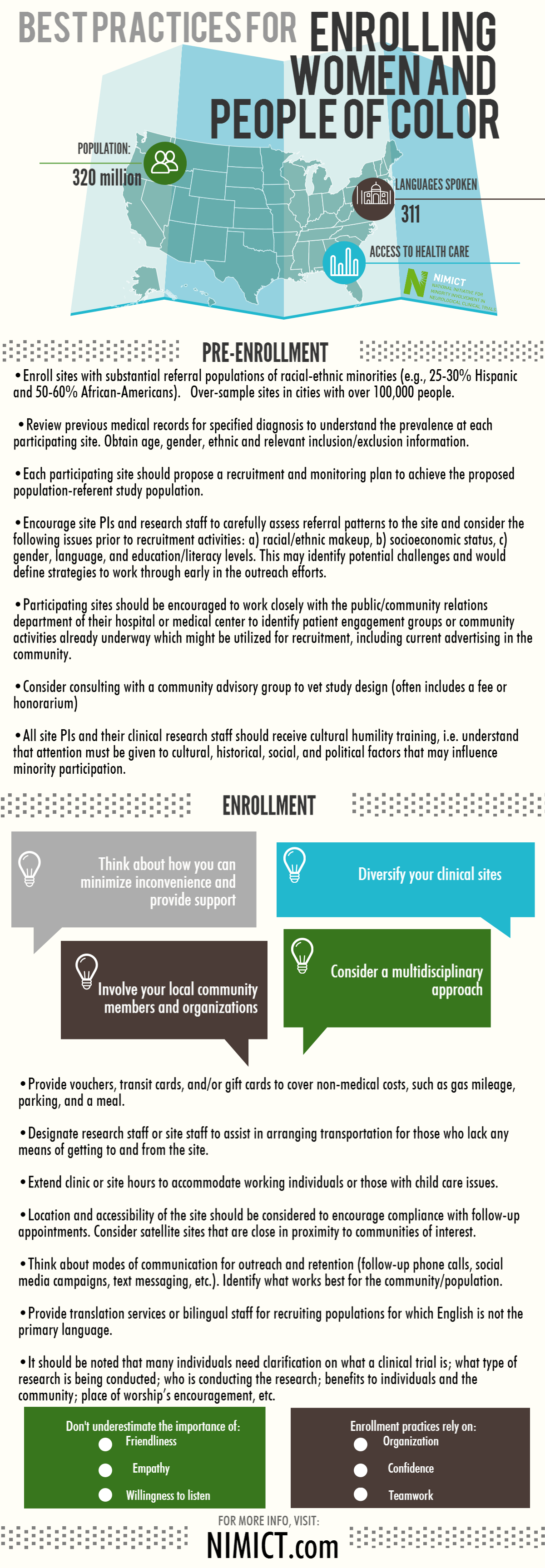Recruitment Best Practices
NIMICT Original

Best Practices for Enrolling Women and People of Color
Population: 320 millions
Languages Spoken: 311
Pre-Enrollment
- Enroll sites with substantial referral populations of racial-ethnic minorities (e.g., 25-30% Hispanic and 50-60% African-Americans). Oversample sites in cities with over 100,000 people
- Review previous medical records for specified diagnosis to understand the prevalence at each participating site. Obtain age, gender, ethnic and relevant inclusion/exclusion information.
- Each participating site should propose a recruitment and monitoring plan to achieve the proposed population-referent study population.
- Encourage the site PIs and research staff to carefully assess referral patterns to the site and consider following issues prior to recruitment activities: a) racial/ethnic makeup, b) socioeconomic status, c) gender, language, and education/literacy levels. This may identify potential challenges and would define strategies to work through early in the outreach efforts.
- Participating sites should be encouraged to work closely with their public/community relations department of their hospital or medical center to identify patient engagement groups or community activities already underway which might be utilized for recruitment, including current advertising in the community.
- Consider consulting with a community advisory group to vet study design (usually includes a fee or honorarium)
- All site PIs and their clinical research staff should receive cultural humility training, i.e. understand that attention must be given to cultural, historical, social, and political factors that may influence minority participation.
Enrollment
- Think about how you can minimize inconvenience and support
- Diversify your clinical sites
- Involve your local community members and organizations
- Consider a multidisciplinary approach
- Provide vouchers, transit cards, and/or gift cards to cover non-medical costs, such as gas mileage, parking, and a meal.
- Designate research staff or site staff to assist in arranging for transportation for those who lack any means of getting to and from the site.
- Extend clinic or site hours to accommodate working individuals or those with child care issues.
- Location and accessibility of the site should be considered to encourage compliance with follow-up appointments. Consider satellite sites that are close in proximity to communities of interest.
- Think about modes of communication for outreach and retention (follow-up phone calls, social media campaigns, text messaging, etc.). Identify what works best for the community/population.
- Provide translation services or bilingual staff for recruiting populations for which English is not the primary language.
- It should be noted that many individuals need clarification on what a clinical trial is; what type of research is being conducted; who is conducting the research study, benefits to individuals and the community; place of worship’s encouragement, etc.
- Don’t underestimate the importance of:
- Friendliness
- Being empathetic
- Willingness to listen
- Enrollment practices rely on:
- Organization
- Confidence
- Teamwork
For more info, visit NIMICT.com
Infographic